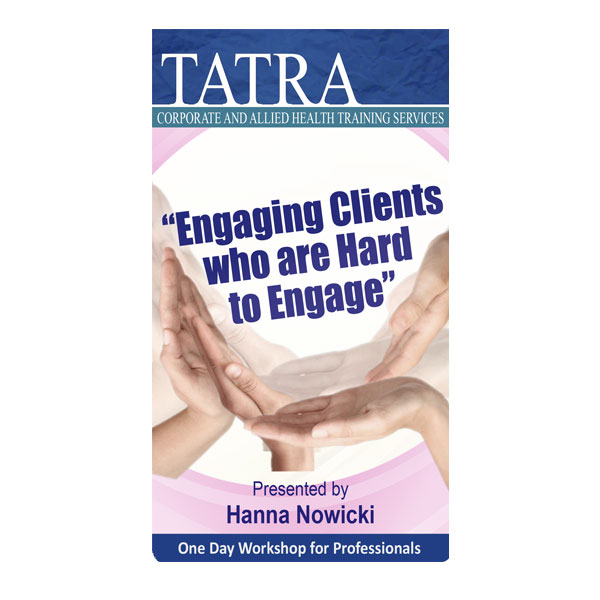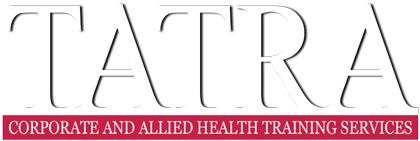Engaging Clients who are Hard to Engage

Presented by Hanna Nowicki (Postgrad. Soc. Work, LLB, BA Psych)
Course Dates
Tuesday 27 April 2021, Adelaide Rockford, 164 Hindley St, Adelaide
Sydney, SMC Conference & Function Centre
The Sydney workshop has been postponed.
We will update all participants in due course.
Standard rate: $325

The majority of clients seen in the social support services are not ready to create change. So called “treatment readiness” seems to be a myth. Yet, most of the modalities we’ve been trained in, except for the Motivational Interviewing Model, assume that clients are in the action mode and that they are ready to create changes in their lives. Practitioners are often under pressure to create outcomes and to establish goals that clients are not ready for. Hence, unproductive patters of client – worker interactions are created; client outcomes are not reached, clients comply rather than co-operate, the real change is not achieved…..
The truth is that it is the system, the workers, who must be ready for the most challenging clients. It is the trait of the best practitioners in the field that they adapt to the clients’ stage of readiness, and that they know how to go about it, equipped with a range of techniques that allow them to respond effectively, sensitively and with therapeutic wisdom.
This is a fast paced, highly practical training designed to teach innovative approaches and ideas to achieve successful outcomes with clients who
- are challenging,
- court-referred,
- unmotivated,
- give you “yes, but…” responses
- are involuntary, or
- who blame others,
- who resist taking responsibility for creating change,
- who change their focus too often, or
- who give you the “I don’t know” responses all the time.
Such clients provide a unique challenge to professionals attempting to provide quality services to both the client and referral source. In this workshop, you will learn what to do in order to prevent, avoid, and resolve what has traditionally been deemed “resistance.” Numerous techniques that are applicable across a wide array of clients and problems will be presented, discussed, and illustrated through video demonstrations. Emphasis will be on “how to” aspects of maximizing the potential for client movement towards goals and positive life changes. The techniques presented can be integrated with all theoretical approaches
Techniques will be offered to create impactful client-practitioner dialogue through the meticulous use of language and other skills in the moment-to-moment interactions. Those trained in traditional Motivational Interviewing will find the techniques offered will take their skills to the next level and circumvent inherent weaknesses in the approach. Upon completion of this training, participants will have a broad array of techniques to add to their repertoire to improve client outcomes and to aid in reducing the stress and burnout that accompanies their most frustrating client-worker interactions.
Who should attend?
The training is applicable to a wide variety of settings across the system. Practitioners such as psychologists, social workers, counsellors, nurses, case managers, parole officers, support workers, employment officers, and other such professionals who have attended his training in the past, have found it extremely helpful in their work towards resolving resistance and creating client co-operation. By focusing on improved responses in the dialogue between the worker and the client, they reported higher confidence in achieving better client outcomes fast.
Learning Objectives
1. Conceptualise resistance in a manner that empowers the client.
2.Describe and understand the most common errors workers make that foster and promote client resistance.
3. Learn how to recognise client’s readiness to change in order to create better client outcomes fast.
4. Learn the principles of working with mandated clients.
5. Learn how to use empathic responses in order to engage clients into a meaningful cooperation rather than compliance. Five stages of Empathy Statements.
6.Use validation techniques in order to express your understanding of client’s situation and build meaningful rapport.
7. Become fluent at using therapeutic confrontation to aid the process of creating change.
8. Understand methods for dealing with common difficulties such as “Yes, but…” and “I don’t know” responses.
The Program
• Dimensions of Resistance.
• Stages of Readiness and how to use them in order to engage.
• Reflective and Additive Empathy.
• Five Levels of Therapeutic Confrontation; and when to use them for therapeutic benefits when you find yourself stuck.
• Responding to silence.
• Responding to “I don’t know” statements.
• How to slow down in order to go faster.
• Meeting the Challenge of Mandatory Clients.
• Turning Complaints into Goals.
• Clients as your Experts.
• How to Use the listening skills and actually hear what the client is saying.
• The “Colombo” technique.
• “Client as Your Expert” technique.
 About the Presenter
About the Presenter
Hanna Nowicki (BA Psych, Postgrad. Social Work, LLB).
Hanna has a degree in law, psychology and in social work. Her professional experience is wide ranging. She has worked in suicide prevention, mental health, child protection, multi-cultural practice, and taught social policy at university. She established and managed the SA Mental Health Training Centre with the NSW Institute of Psychiatry. Hanna is an experienced high energy presenter who focuses on practical application of techniques and models. She is the founder and owner of TATRA Training Services, and has trained nearly 20,000 people over the last 20 years.
A certificate of attendance will be emailed to participants following the workshop.


